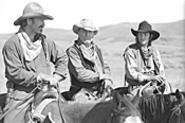Kevin Costner appeared in his first Western when he was 30 and looked to be in his early 20s. He was a slender, restless actor in Lawrence Kasdan's Silverado, the 1985 film in which Costner played the blithe brother of a somber Scott Glenn -- all giggles and gunshots, a noisemaker always one dawn away from getting hanged for a crime he didn't commit. Surrounding Costner were older actors in easier roles: Glenn as the innocent man just released from prison, Kevin Kline as the reformed train-robber-turned-saloon-owner, Danny Glover as the vengeful son of a murdered father, Brian Dennehy as the corrupt sheriff. They were all archetypes lifted from the films of Howard Hawks and John Ford and Anthony Mann and John Sturges -- quiet loners banded together against the forces of corruption and evil. But Costner's Jake was an anomaly -- an anachronism, actually -- a 1980s man who found himself dolled up like a cowboy in the 1880s. A Yippee, if you will, for the yuppie audience for whom the Western was as dead as Gary Cooper.
Costner would continue to make Westerns, but never with so much spirit; it's as though he has spent the past 18 years trying to live down Jake, a man who literally rolled in the hay with prostitutes and reveled in the killing of two men with one shot. Since '85, he has appeared in several Westerns: 1990's Dances with Wolves, his overlong David Lean-styled epic, for which he garnered myriad Oscars; Wyatt Earp, a 1994 Kasdan-directed all-star drone that seemed to last till 1995; and '97's The Postman, a post-apocalyptic horse opera summarily reduced to glue. Each has been more dour and egocentric than its predecessor; the goofy gunman has gone gloomy, as Costner further distances himself from Silverado's affable chap in chaps.
Now comes Open Range, the latest apologia of a man who, somewhere along the way, decided that he was better suited to the scowl than the smirk. One could write a thesis, comparing and contrasting Open Range with Silverado: same story, same outcome, even the same antagonist (that film's baddie was also named Baxter). Cowboys -- among them Costner's Charley Waite and Robert Duvall's Boss Spearman -- pull into a town and find themselves in a showdown with the cattle baron who wants them off his land and the sheriff who's on his payroll. Charley and Boss are "free-grazers," cattlemen who still think a land without fences is a land without rules; they'll sleep where they want, feed where they want, and live where they want. Baxter (Michael Gambon) considers them a virus decimating his property, and he wants them dead. Free-grazers are, he insists, worse than the Indians.
Where Silverado swaggered, Open Range sulks; it's no fun at all. That alone is no reason to damn it; the latter-day revisionist Western (Clint Eastwood's Pale Rider and Unforgiven, say, or Wyatt Earp) reflects the belief that to be taken seriously, it must be solemn and contemplative -- a commentary on the genre, rather than just an entertaining addition to it. They're film-theory classes dolled up as entertainment -- lectures about men with violent pasts, trying to move into a more civilized future; they tamed the land and now aim to tame themselves. Charley Waite is such a man, a gunslinger with a past that he tries to keep from Boss Spearman; he drops plenty of hints ("I got no problem with killin', Boss, never have"), but in a decade of riding together, has revealed little of himself.
Of course, to us he need say nothing: We know everything about Charley and Boss and the two young men who ride with them, Mose (E.R.'s Abraham Benrubi) and Button (Y Tu Mamá También's Diego Luna). Their backstories -- of the old-timer who prefers a roof of nighttime stars, or the kid taken on after his parents were gunned down -- live in every Western ever made and in every audience member who's seen one. We know what's said in every silent stare between men who don't want to kill, but eventually have no other choice. One man's cliché is another man's convention, and Costner believes he's reinventing the horseshoe. At least Annette Bening, as Charley's love interest, isn't a whore; she's the doc's sister and willing to take Charley, just because he's the only decent man to ride into town since forever.
Silverado worked because it embraced its clichés without winking; its showdown felt thrilling and truly climactic, not merely inevitable. Here, it's just another gunfight (albeit with a small, knowing twist) in just another movie in which men who don't want to kill do so, because they must. It's beautiful to look at (one need only turn on the camera to capture the beauty of Alberta, Canada) and well-acted (Duvall need do little more than show up, to play the part of the weary old-timer) and well-executed (this is no abominable Postman). But it takes forever to get to where we've been before -- way out West, where the sun set on the Western a long, long time ago.


